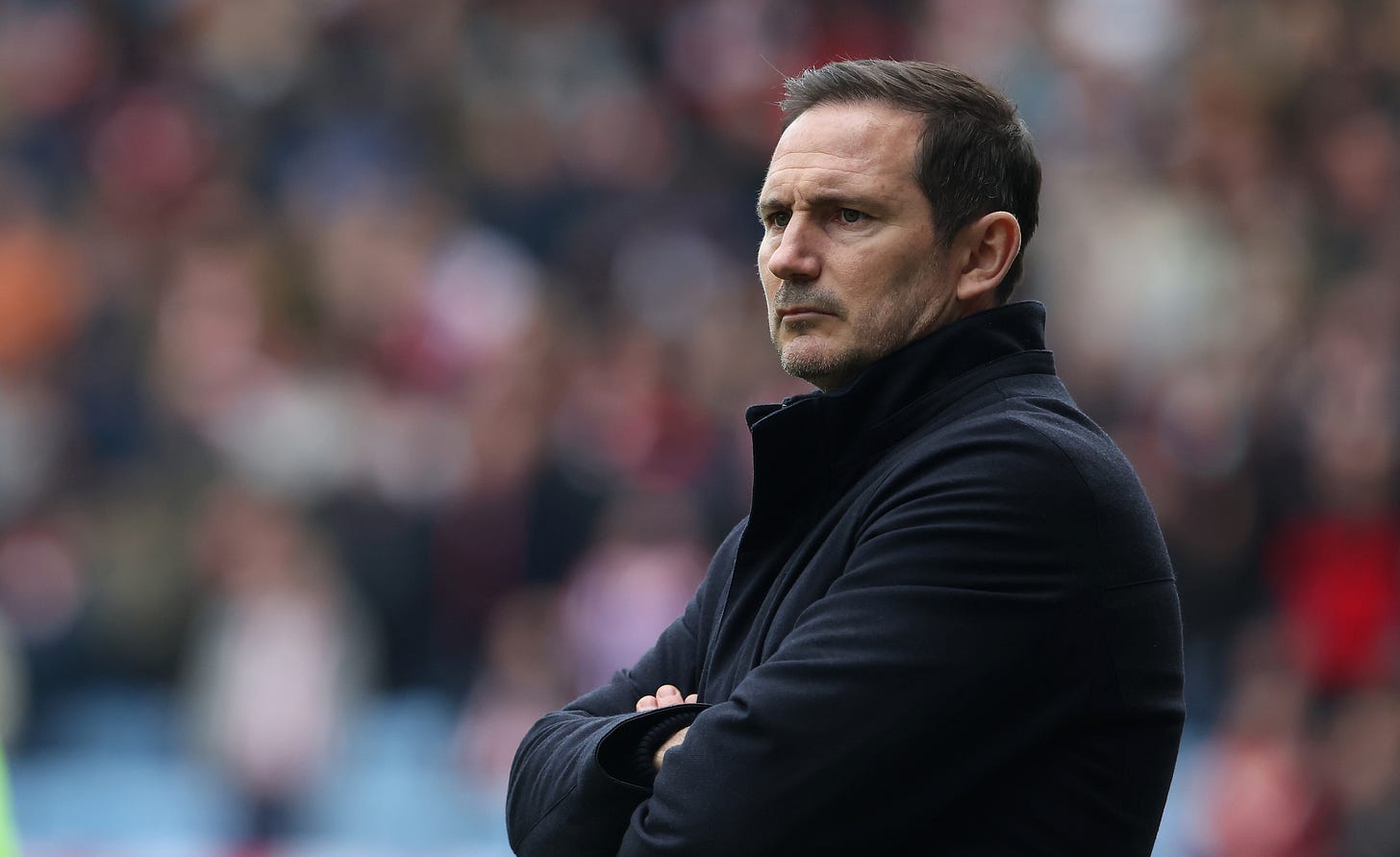Lampard: "Football has a duty to do more about dementia"
Chelsea and England legend speaks out
Frank Lampard’s beloved grandmother passed away with dementia. He has seen how neurodegenerative disease afflicted Martin Peters, his father’s old West Ham United team-mate. Lampard knew Chelsea legends like Peter Bonetti, who had Alzheimer’s and died in 2020. Bobby Tambling, whose Chelsea goalscoring record was broken by Lampard, has been diagnosed with dementia. “It’s a really, really terrible thing,” Lampard reflects.
Dementia is a cruel scourge on society, robbing people of their memory and connection with family, and has cut like a scythe through ageing footballers. Research shows that professional footballers are three times more likely to suffer from neuro-degenerative diseases than other people.
It is why Lampard, 47, took time out from preparing his high-flying Coventry City players for Saturday’s Championship summit meeting with second-placed Stoke City to support his club’s dementia initiative at the CBS Arena yesterday afternoon.
“Dementia is close to my heart for family reasons, so to see the work that we’re doing is amazing and long may it continue and can we help even more?’’ Lampard tells me. “And from living a bit of it in my family at different times, I understand how devastating it can be and what a terrible thing it is.
“It’s great that we have the awareness of it in football. Can the awareness rise more? Yes, can we make sure we’re doing the right thing? The game has a duty to do that. It’s such a shame when you hear those stories and I’ve seen players and the great, great names at Chelsea. I’ve seen them be affected by it seriously and it’s a really, really terrible thing. We have to do all we can do to help.”
England’s golden boys of 66 are always in our hearts and thoughts, not least with talk intensifying over who should be picked for a World Cup coming 60 years after the country’s greatest sporting moment. Dementia mercilessly raided that fabled dressing-room of Sir Alf Ramsey’s.
The full-back Ray Wilson died in 2018 having lived with Alzheimer’s for 14 years. The following year, the elegant Peters succumbed to dementia. Nobby Stiles, that symbol of midfield defiance, passed away in 2020 having suffered from CTE (Chronic Traumatic Encephalopathy).
Stiles sold some of his medals in 2013 to pay for his dementia care. These ran to £125,000 and are one of the reasons why Stiles’ son John, a powerful campaigner on dementia, argues that the Professional Footballers’ Association needs to support the families more.
Jack Charlton, Ramsey’s colossus at the back, also died in 2020 with dementia. Four years earlier, I interviewed Jack for a book on England and was advised to show him photos of 66 to trigger his memories. Jack’s brother, Sir Bobby, was diagnosed with dementia in 2020 and passed away in 2023. “We’ve seen (what’s befallen) the generation of the 66 boys,” Lampard adds. “We should talk about it.”
Dementia has claimed so many players: Jeff Astle, Chris Sutton’s father Mike, Billy McNeill, Chris Nicholl and Stan Bowles, amongst many others. “I’ve seen it with Dean Windass last year,” Lampard adds of the 55-year-old former striker’s diagnosis. “That makes you really think about it.” One of the first things the consultant asked Windass was how many balls he’d headed. Windass now talks out powerfully about the risks.
The FA has introduced a ban phasing out heading amongst younger players. The Premier League advised the reduction in heading by players in training. It now has a mandatory education module for first-team and academy players, delivered by Sporting Chance, to increase understanding of head injuries and brain health. This education work is extending to managers, coaches and medical staff.
Researchers in Sweden in 2023 found that outfield players are 1.6 times more likely to have Alzheimer’s and other forms of dementia than non-players. Goalkeepers, who rarely head the ball, were found to have the same affliction rate as non-players, leading researchers to highlight the damage of heading.
“I headed it occasionally, not that many times, I scored a few with my head, but not so much,” Lampard says. “It was one part of my footballing education growing up, I probably didn’t head it enough. It wasn’t the best part of my game. Do I worry so much myself? Not so much. I don’t know if I’m being naive or just a bit neglectful of not thinking about it for myself so much, but I worry about it for the players, the (older) generation that we’re talking about more.”


